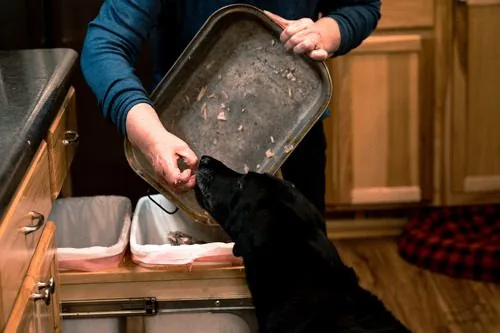Thanksgiving and other festive occasions often involve sharing delicious meals with our loved ones, including our pets. However, while it may be tempting to share a bit of your holiday feast with your dog, it’s important to understand the risks involved. One of the most common concerns during these times is whether your dog can eat turkey bones. In this article, we’ll explore why it is crucial to keep turkey bones away from your dog, the potential dangers involved, and safe alternatives to share with your pet.

The Risks of Feeding Turkey Bones to Your Dog
When considering if a dog can eat a turkey bone, it’s essential to recognize the inherent risks. Turkey bones, particularly when cooked, can splinter easily. These sharp fragments can pose significant hazards to your dog’s health, leading to a variety of serious issues.
Cooked turkey bones are brittle and can break into sharp pieces. These pieces can cause injuries to your dog’s mouth, throat, and digestive tract. The sharp edges can puncture the esophagus, stomach, or intestines, leading to internal bleeding and severe pain. Such injuries can require emergency veterinary care, which is both stressful and costly.
Potential Choking Hazards
In addition to the risk of internal injuries, turkey bones can also present choking hazards. If a dog swallows a bone without chewing it thoroughly, the bone can get lodged in the throat or esophagus. This can block the airway, making it difficult for your dog to breathe. Immediate veterinary intervention is often necessary in such cases to remove the obstruction and ensure your dog’s safety.
Health Complications from Ingesting Turkey Bones
Feeding turkey bones to your dog can lead to a range of health complications, many of which require prompt veterinary attention. These complications can be painful and potentially life-threatening.
Perforation and Obstruction
One of the most severe consequences of ingesting turkey bones is perforation. The sharp edges of splintered bones can tear through the lining of the digestive tract, causing perforations. This can lead to peritonitis, a serious infection of the abdominal cavity, which requires immediate medical intervention.
Obstruction is another significant risk. If bone fragments become lodged in the intestines, they can block the passage of food and waste. This can cause severe discomfort, vomiting, and dehydration. In some cases, surgical intervention may be necessary to remove the blockage and restore normal function.
Gastrointestinal Upset
Even if the bones do not cause physical injuries or obstructions, they can still lead to gastrointestinal upset. The high fat content in turkey, combined with the bones, can cause pancreatitis, an inflammation of the pancreas. Symptoms of pancreatitis include vomiting, diarrhea, abdominal pain, and lethargy. This condition can be severe and may require hospitalization and intensive treatment.
Safe Alternatives to Share with Your Dog
While turkey bones are off-limits, there are plenty of safe and healthy alternatives you can offer your dog during the holidays. These alternatives can help ensure your pet feels included in the celebrations without risking their health.
Boneless Turkey Meat
If you want to share some turkey with your dog, opt for boneless, skinless turkey meat. Make sure it is fully cooked and free of any seasoning or spices, as these can be harmful to dogs. Turkey meat is a good source of protein and can be a healthy treat in moderation.
Dog-Friendly Treats
Consider preparing or purchasing dog-friendly treats specifically designed for their dietary needs. Many pet stores offer a variety of holiday-themed treats that are safe and enjoyable for dogs. Additionally, you can find recipes online for homemade treats that use ingredients like pumpkin, sweet potatoes, and apples, which are nutritious and safe for dogs.
What to Do If Your Dog Eats a Turkey Bone
Accidents can happen, and if your dog manages to eat a turkey bone, it’s important to act quickly and calmly. Knowing the appropriate steps to take can make a significant difference in your dog’s health outcome.
Monitoring for Symptoms
After realizing your dog has ingested a turkey bone, closely monitor them for any signs of distress or discomfort. Symptoms to watch for include choking, coughing, excessive drooling, vomiting, diarrhea, lethargy, and abdominal pain. If you notice any of these signs, contact your veterinarian immediately.
Seeking Veterinary Care
If your dog exhibits symptoms of distress or if you are concerned about their health after ingesting a bone, it’s crucial to seek veterinary care promptly. Your veterinarian can perform an examination and may recommend diagnostic tests such as X-rays to determine if there are any obstructions or injuries. Early intervention can prevent complications and ensure the best possible outcome for your dog.
Making Informed Decisions for Your Dog’s Health
Ensuring your dog stays safe, and being aware of the risks associated with turkey bones can help you make informed decisions. By offering safe alternatives and monitoring your pet closely, you can enjoy turkey without worry. Contact Birch Lake Animal Hospital for more information or assistance with your pet’s needs. Our team is dedicated to providing the best care for your furry family members. Call us at (651) 426-2246 or book an appointment online today!
Recent Posts
About Birch Lake Animal Hospital
The staff at Birch Lake Animal Hospital seeks to provide the best possible medical care for our highly-valued patients and clients.





